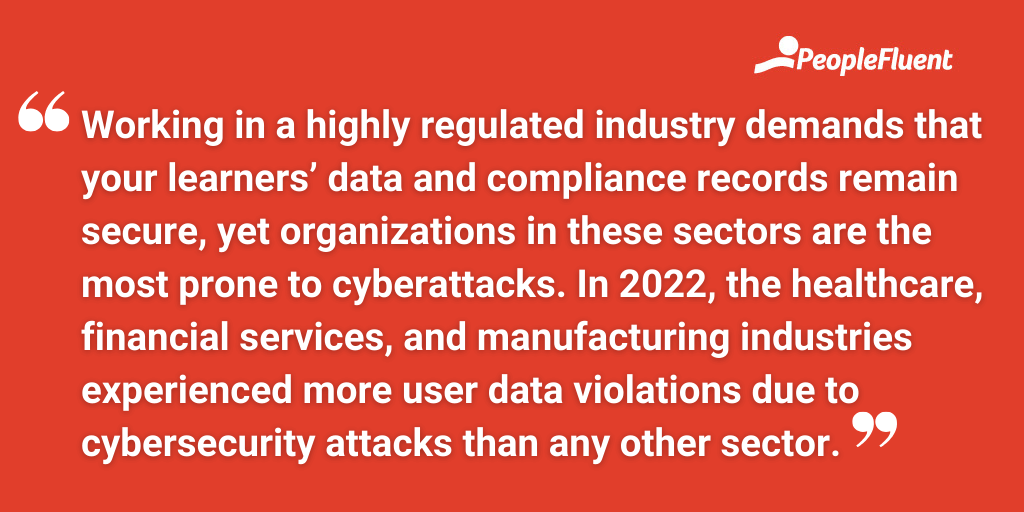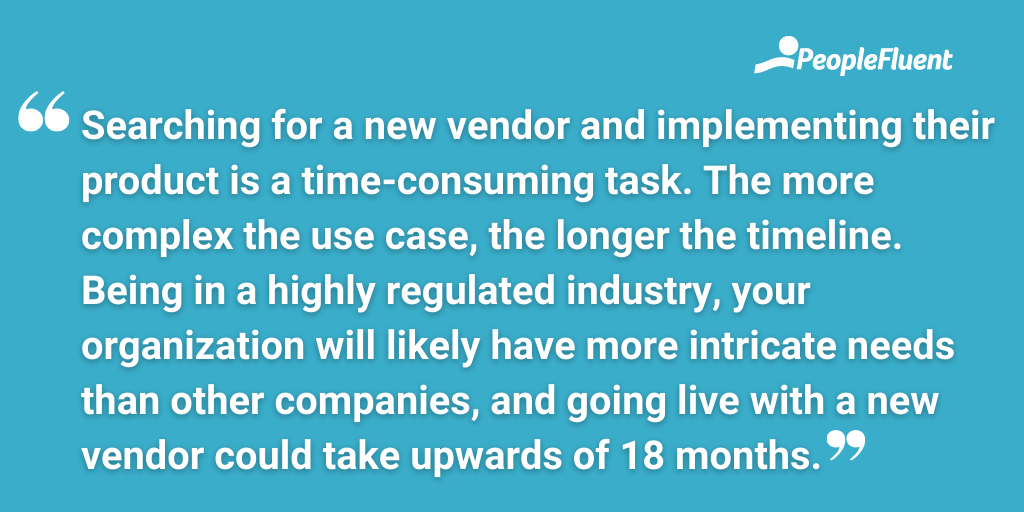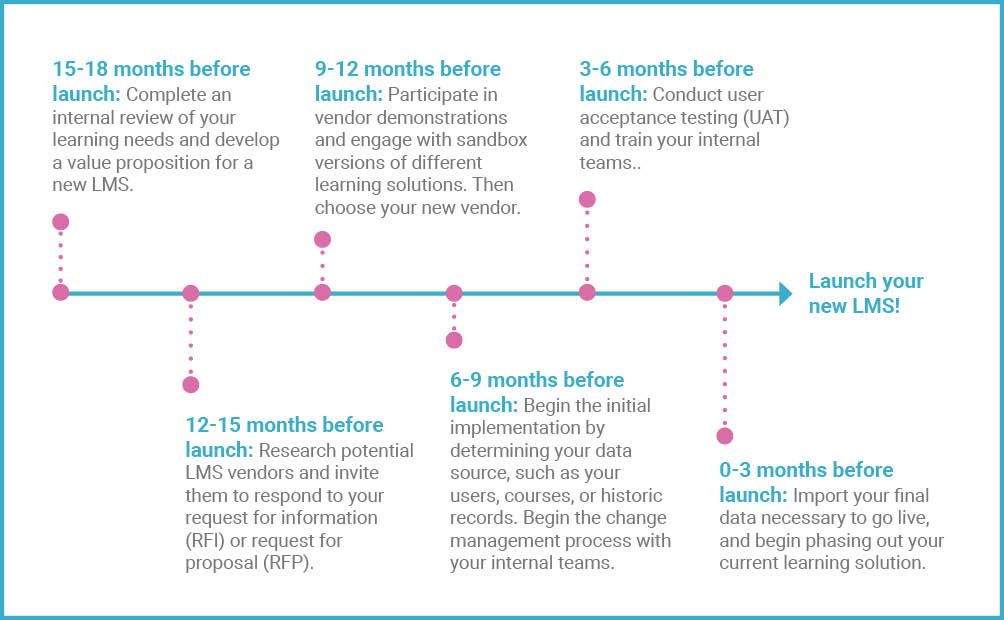Published: Oct 17, 2023Time to read: 7mins Category: Learning
3 Steps to Choosing the Right LMS in Highly Regulated Industries
There’s a lot on the line for companies in highly regulated industries, especially when it comes to developing and documenting employee skills. In this blog post, discover how organizations with complex training needs can choose the learning management system (LMS) that’s right for their workforce.
Not every LMS is best suited to managing the complexities of businesses in highly regulated industries. There are tons of software options out there, so it’s essential that you understand your organization’s learning needs in order to choose the LMS that’s right for you and your learners.
Before you start researching vendors, make sure you (or your L&D leaders) establish a value proposition. Speak with employees and leadership within your business to find out what might be lacking in your current professional development strategy, as well as which features your learners and administrators might find useful in an LMS.
From there, you can create a list of features your new LMS needs to have—plus a list of things you don’t want! You’ll use this list to start researching vendors who can potentially meet your learning needs. With a list of vendors in mind, you can find the right LMS for you by following these three steps.

Step 1) Ask Potential Vendors the Right Questions
You’ll likely find that there are multiple vendors offering similar software features that could meet your L&D needs, but choosing the right LMS is about more than the software’s technical capabilities. Your vendor should have experience serving other organizations in your industry, so ask for examples. While vendors aren’t likely to hand out their client lists, they should be able to show you case studies or other examples of how they’ve provided learning software solutions for companies in high-consequence industries like energy, aviation, healthcare, and more.
Working in a highly regulated industry demands that your learners’ data and compliance records remain secure, yet organizations in these sectors are the most prone to cyberattacks. In 2022, the healthcare, financial services, and manufacturing industries experienced more user data violations due to cybersecurity attacks than any other sector.
To ensure your user information stays safe, you’ll also want to ask potential vendors how they manage their clients’ security. Ask whether they have any certifications from industry-recognized associations, such as the International Organization for Standardization (ISO) or System and Organization Controls (SOC).
You should also ask vendors what specific certifications they have. Some certifications to look for include:
- SOC 2 Type 2, which relates to how cloud-based vendors handle sensitive information.
- ISO 27001, which defines the requirements an information security management system must meet to be compliant.
- EU-US Data Privacy Framework, which ensures US-based organizations provide secure data transfers and protection consistent with legislation in the European Union.
This will give you and your leadership team a better understanding of how vendors might manage your sensitive information, such as compliance data.
Other important questions to ask include:
- Is their LMS software hosted on-premise or off-premise (i.e. in the cloud)?
- How do they access your data, and what capabilities do they have to import and export sensitive information?
- What services do they offer related to client support and success?

MORE ON LMS SECURITY | ‘Single Tenant vs. Multi-Tenant Software: Is On-Premise LMS Hosting Right for Your Business?’
Step 2) Understand Your Timeline
There’s no standard timeline when it comes to implementing a new LMS, but it’s important to be realistic. If you’ve just started to work on your value proposition, you won’t be going live with a new learning tool next month.
Searching for a new vendor and implementing their product is a time-consuming task. The more complex the use case, the longer the timeline. Being in a highly regulated industry, your organization will likely have more intricate needs than other companies, and going live with a new vendor could take upwards of 18 months.
When choosing your next learning solution, it’s best to work backwards with your L&D and leadership teams to decide on your approximate go-live date. With that goal in mind, you can begin evaluating potential vendors who can meet your technical criteria within your desired timeline.
Here’s an example of an LMS implementation timeline for an organization in a highly regulated industry:
- 15-18 months before launch: Complete an internal review of your learning needs and develop a value proposition for a new LMS.
- 12-15 months before launch: Research potential LMS vendors and invite them to respond to your request for information (RFI) or request for proposal (RFP).
- 9-12 months before launch: Participate in vendor demonstrations and engage with sandbox versions of different learning solutions. Then choose your new vendor.
- 6-9 months before launch: Begin the initial implementation by determining your data source, such as your users, courses, or historic records. Begin the change management process with your internal teams.
- 3-6 months before launch: Conduct user acceptance testing (UAT) and train your internal teams.
- 0-3 months before launch: Import your final data necessary to go live, and begin phasing out your current learning solution.
- Launch your new LMS!

Please note the timeline for your organization could be different based on your specific requirements and your team’s available bandwidth to facilitate the implementation.
MORE FOR YOU | ‘How a Modern Learning Strategy Is Essential to Your Future Training Efforts’
Step 3) Work Alongside Your Vendor for a Successful Implementation
One of the most important aspects of a successful platform implementation is the relationship between you and your LMS vendor. Think of this relationship as being on a team with the common goal of improving the learning and development environment within your organization.
When assembling your LMS implementation team, be mindful of your expectations and everyone’s current workload. It’s highly unlikely that the people within your organization working on the implementation will be solely dedicated to that task. Your vendor should be willing to accommodate meeting schedules that don’t interfere with your workforce’s other responsibilities. That said, it will also be important to make sure your team is available to make important decisions related to the implementation to keep things from slowing down.
As with any team, open communication from everyone involved will make the process much smoother. Your vendor should be upfront with you regarding the capabilities of its LMS, as well as its ability to meet your timeline expectations. Likewise, you need to be direct about your expectations and understanding of the product. Different learning platforms often use similar terminology that can have various meanings. Don’t be shy about asking your vendor questions about the system if something isn’t clear. The right LMS vendor will take its time to ensure everyone understands the software so you can have a positive experience.
When it’s time to migrate your data, be selective about how much you import from older systems. Evaluate your current needs and priorities, and work with your vendor to determine what data you truly need.
Your vendor should also be providing proper training on the LMS in addition to your implementation meetings. Take an active part in the training and be as hands on as possible. Working alongside your vendor throughout the process is the best way for you to learn how to navigate within the LMS and have a successful implementation.
FURTHER READING ON HOW TO STAY COMPLIANT | ‘How Compliance Training in Your LMS Protects Your High-Consequence Organization’
Know Your Learning Needs and Take Your Time
Your employees and organizational structure are unique, so it’s essential that you select a learning management system vendor who will treat your learning needs that way. You know your organization and workforce better than any potential learning vendor, so use that knowledge to your advantage when choosing your next LMS. Ask plenty of questions, take your time, and be sure to work alongside your chosen partner when it’s time to implement your new system. Workforce development is crucial to your success, so be sure to invest in a vendor who wants to win with you.
Manage Your Complex Learning Needs
Ready to learn more about choosing the LMS that’s right for your organization? Download our ebook, ‘How Enterprise Companies in Highly Regulated Industries Choose the Right LMS,’ or get a demo today.